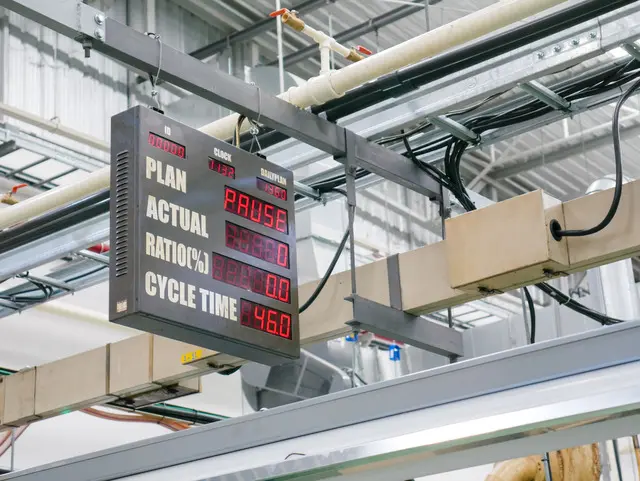Unlocking the Power of Shipping and Logistics Automation for Manufacturing
In the fast-paced manufacturing industry, streamlining shipping and logistics processes is crucial for efficiency and accuracy. Manual processes can lead to delays, errors, and increased operational costs. Shipping and logistics automation offers a powerful solution to these challenges, leveraging the capabilities of Python, AI, and cloud-based solutions.
Shipping and logistics automation empowers manufacturers to automate tasks such as shipping label generation, package tracking, and logistics coordination. By integrating with shipping carriers and logistics providers, manufacturers gain real-time visibility into their shipments, enabling them to optimize delivery routes and enhance customer satisfaction.

The Role of Python, AI, and Cloud in Shipping and Logistics Automation
Python for Unattended and Attended Bots
Python’s versatility and extensive library support make it an ideal choice for developing both unattended and attended bots for shipping and logistics automation. Unattended bots can automate repetitive tasks such as label generation and shipment tracking, freeing up human resources for more strategic activities. Attended bots, on the other hand, can assist human workers with complex tasks, providing real-time guidance and data analysis. Python’s customization capabilities empower businesses to tailor bots to their specific requirements.
Cloud Platforms: A Superior Orchestration Solution
Cloud platforms offer a comprehensive suite of features and capabilities that surpass traditional RPA/workflow tools. Their scalability, flexibility, and integration options make them ideal for orchestrating complex shipping and logistics automation processes. Cloud platforms can seamlessly integrate with shipping carriers, logistics providers, and other business systems, providing a centralized platform for real-time data exchange and process coordination.
AI for Enhanced Accuracy and Edge Case Handling
AI techniques such as image recognition, natural language processing (NLP), and generative AI can significantly enhance the accuracy and efficiency of shipping and logistics automation. Image recognition can automate tasks like package inspection and damage assessment, while NLP can process unstructured data such as shipping documents and customer inquiries. Generative AI can optimize delivery routes and predict potential delays, enabling manufacturers to respond proactively to disruptions.

Building a Robust Shipping and Logistics Automation Solution with Python and Cloud
Process Analysis and Automation
The first step in building an effective shipping and logistics automation solution is to analyze the processes involved. This includes identifying repetitive tasks, data entry points, and potential bottlenecks. Once the processes are understood, Python scripts can be developed to automate each sub-process.
1. Label Generation: Python scripts can generate shipping labels based on data from the manufacturing system or ERP. The scripts can automatically populate label fields, select appropriate shipping carriers, and print or send labels to designated printers.
2. Package Tracking: Python scripts can track packages in real time by interfacing with shipping carrier APIs. The scripts can retrieve shipment status updates, estimated delivery times, and other relevant information, which can be stored in a central database for easy access.
3. Logistics Coordination: Python scripts can coordinate logistics activities such as scheduling pickups, managing inventory levels, and optimizing delivery routes. The scripts can integrate with logistics providers to automate the exchange of data and ensure smooth coordination.
Data Security and Compliance
Data security and compliance are paramount in the manufacturing industry. Python scripts can be designed to adhere to industry standards and regulations, such as HIPAA and GDPR. The scripts can encrypt sensitive data, control access to confidential information, and generate audit trails to ensure compliance.
Python vs. No-Code RPA/Workflow Tools
Python offers several advantages over no-code RPA/workflow tools for shipping and logistics automation:
- Flexibility and Customization: Python allows for greater flexibility and customization compared to pre-built RPA tools. This enables businesses to tailor their automation solutions to their specific requirements and integrate them seamlessly with existing systems.
- Scalability: Python scripts can be easily scaled to handle increasing volumes of shipments and complex logistics operations.
- Cost-Effectiveness: Building automation solutions with Python can be more cost-effective than purchasing and licensing proprietary RPA tools.
- Open Source: Python is an open-source language, which means businesses are not tied to a specific vendor or platform.
Algorythum’s Approach
Algorythum takes a different approach to shipping and logistics automation because we recognize the limitations of off-the-shelf RPA platforms. Our team of Python experts develops custom automation solutions that are tailored to the unique needs of each client. This approach ensures that our clients achieve optimal performance, scalability, and cost-effectiveness from their automation initiatives.

The Future of Shipping and Logistics Automation
The future of shipping and logistics automation is bright, with numerous emerging technologies poised to further enhance the capabilities of these solutions. Here are a few potential advancements to look forward to:
- Blockchain: Blockchain technology can bring transparency and security to shipping and logistics automation processes, enabling real-time tracking of shipments and secure data sharing among all stakeholders.
- Internet of Things (IoT): IoT devices can provide real-time data on the location and condition of shipments, allowing for proactive monitoring and predictive maintenance.
- Artificial Intelligence (AI): AI algorithms can optimize delivery routes, predict potential delays, and even automate customer service interactions, leading to increased efficiency and improved customer satisfaction.
Subscribe and Contact Us
To stay updated on the latest trends and advancements in shipping and logistics automation, subscribe to our newsletter. Our team of experts is also available to provide a free feasibility assessment and cost estimate for your custom automation requirements. Contact us today to learn more about how Algorythum can help you streamline your shipping and logistics operations.

Algorythum – Your Partner in Automations and Beyond
At Algorythum, we specialize in crafting custom RPA solutions with Python, specifically tailored to your industry. We break free from the limitations of off-the-shelf tools, offering:
- A team of Automation & DevSecOps Experts: Deeply experienced in building scalable and efficient automation solutions for various businesses in all industries.
- Reduced Automation Maintenance Costs: Our code is clear, maintainable, and minimizes future upkeep expenses (up to 90% reduction compared to platforms).
- Future-Proof Solutions: You own the code, ensuring flexibility and adaptability as your processes and regulations evolve.









